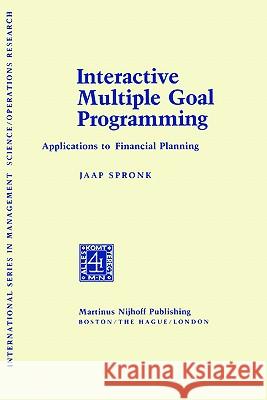Interactive Multiple Goal Programming: Applications to Financial Planning » książka
Interactive Multiple Goal Programming: Applications to Financial Planning
ISBN-13: 9780898380644 / Angielski / Twarda / 1981 / 259 str.
1. 1. Motivation This book is based on the view-tx)int that both public and private decision making, in practice, can often be ilrproved upon by means of fonnal (nonnative) decision nodels and methods. To sane extent, the validity of this statement can be measured by the irrpressive number of su=esses of disciplines as operations research and management science. Hcwever, as witnessed by the many discussions in the professional journals in these fields, many rrodels and methods do not completely meet the requirements of decision making in prac tice. Of all possible origins of these clear shortcomings, we main-. ly focus on only one: the fact that nost of these nodels and methods are unsuitable for decision situations in which multiple and possi bly conflicting objectives playa role, because they are concentra ted on the (optimal) fulfilment of only one objective. The need to account for multiple goals was observed relatively early. Hoffman 1955], while describing 'what seem to be the prin cipal areas (in linear prograrrrning) where new ideas and new methods are needed' gives an exanple with conflicting goals. In this pro blem, the assignrrent of relative weights is a great problem for the planning staff and is 'probably not the province of the mathemati cian engaged in solving this problem'. These remarks were true pre cursors of later develor: nents. Nevertheless, the need for methods dealing with multiple goals was not widely recognized until much later.











